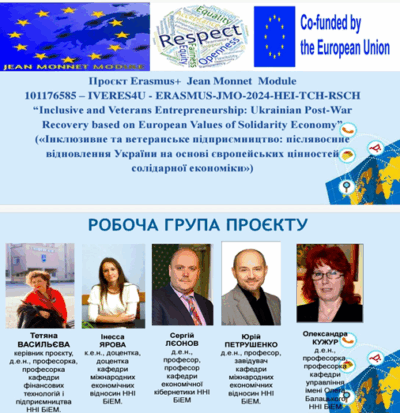In November 2024, the implementation of the Jean Monnet project (Module) 101176585 – IVERES4U – ERASMUS-JMO-2024-HEI-TCH-RSCH ‘Inclusive and Veterans Entrepreneurship: Post-war recovery of Ukraine based on the European values of the solidarity economy’ of the EU Erasmus+ programme.
The IVERES4U project aims to create a common framework for inclusive and national veterans’ entrepreneurship competencies at the national, regional, and interregional levels that could help harmonise, disseminate and measure skills when starting up and operating a business in the context of sustainable and inclusive growth for Ukraine’s post-war recovery based on European values and practices.
The project is designed for undergraduate students from different regions of Ukraine, for specific and vulnerable population groups (primarily, internally displaced persons, veterans, people suffering from mental or physical ill-health, and people with disabilities who typically have lower levels of self-confidence), for social entrepreneurs, and students of second higher education (Lifelong Learning) to mainstreaming the experience of creating a common framework for inclusive and national veterans entrepreneurship competencies, and also to overcoming skills gaps that remain an important barrier to sustainable and inclusive growth.
The project team intends to adopt comprehensive approach thanks to: the interdisciplinary nature of the research, maintaining close links among the civil society, scientists, businesses, local authorities, non-governmental organizations, and partner universities, and the development of training and educational (three academic blocks) capacities to address project objectives; to develop a study course; to design a study guide, and to create a platform for fruitful communication and bridging insights among stakeholders to promote social dialogue and collective bargaining in the solidarity economy. The educational activities will be implemented using such innovative teaching methods as: blended learning: lectures, distance learning, intensive course for mixed target groups, workshops, webinars, discussion panels.
Fruitful work and creative achievements!

